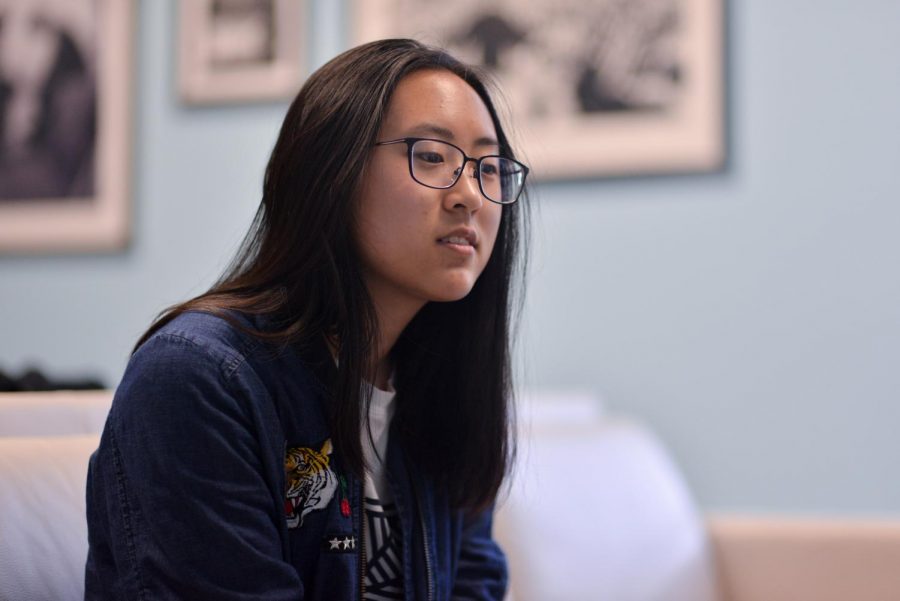Humans of Harker: Serena Lu strives to uncover truth
“For the longest time, a really big fear that I had is that there would just be something in our general education curriculum that was wrong that we’ve always been taught that way and I will just never know it was wrong for as long as I live and for my entire life I would just never know that what we learned was wrong,” Serena Lu (12) said. “And this has happened for a lot of the things I’ve learned. I guess I hope that if at least one of my long winded rants in some class has ever changed someone’s mind, I guess that’d be enough.”
June 2, 2018
Thanksgiving—what images and memories does that holiday bring to mind? Pilgrims, perhaps, or turkey stickers and red paper leaves. Maybe even snippets of a history lecture on British relations with Native Americans.
For Serena Lu (12), however, Thanksgiving is only another cultural artifact whose reputation in popular culture proves that history can, and will, be distorted by those who have the power to teach it.
“For the longest time, a really big fear that I had is that there would just be something in our general education curriculum that was wrong that we’ve always been taught that way and I will just never know it was wrong for as long as I live,” Serena said.
With her soft voice and calm demeanor, at first glance, Serena hardly seems to be one to challenge authority. Her work as a debater, an artist and a Near Mitra scholar, however, proves otherwise.
“I’m very interested in the idea of truth and how it can be distorted, and I think debate has been a way for me to try to pursue some sort of truth, while my Mitra paper and my latest art shenanigan are ways for me to discuss and unpack how the truth can be distort in ways that are beyond our general comprehension,” she said.
One of her most recent works, entitled “How to Get Away with (mass) Murder,” for example, constitutes of a series of playing cards on which a image and a short phrase work together to allude to the different ways in which crimes such as mass murder can be covered up.
“The text in the cards is somewhat satirical in that it treats you the reader as the person who’s trying to cover up a mass murder, so it does have this element of dark humor to the whole thing.”
Serena’s Near Mitra paper expands on this theme and discusses the post-World War II Japanese textbook system, which consists of a screening process designed to eliminate textbooks that include information on Japan’s war crimes.
“Japan often gets a pretty good [reputation] among most people—I think during the Olympics the NBC commentator said something about how Japan was a great model that South Korea was sure to want to follow and that prompted some huge backlash because Japan had colonized Korea during WWII and had led to some really devastating impacts in the country,” she said. “So many people are unaware of these things that I think it’s important to discuss [them] and not let Japan off the hook necessarily because I think the US plays a shockingly large role in the fact that Japan hasn’t needed to own up to their war crimes in ways that other countries like Germany had to.”
Although the truth often appears to be one half of a black-and-white dichotomy, Serena keeps in mind its endless complexity when working to unravel both past and present-day issues.
“The world isn’t as simple as just two plus two equals four, but there’s a bunch of factors that go on,” she said. “There’s multiplication, there’s parentheses, there’s exponents that you all have to consider when you think about ideas and possible solutions to problems.”
In Emily Chen’s (12) character assessment, Serena is “so stressed that she is chill.”
“She doesn’t freak out about anything,” Emily said. “She’s really dichotomous, because she has that really calm demeanor, but she’s also very passionate about a ton of different things, like ice skating, artistic video games, the State Department — a lot of varied interests that you wouldn’t expect a high schooler to have.”
Serena hopes to affect change through the education system.
“I guess I hope that if at least one of my long winded rants in some class has ever changed someone’s mind, I guess that’d be enough,” she said.


















![“[Building nerf blasters] became this outlet of creativity for me that hasn't been matched by anything else. The process [of] making a build complete to your desire is such a painstakingly difficult process, but I've had to learn from [the skills needed from] soldering to proper painting. There's so many different options for everything, if you think about it, it exists. The best part is [that] if it doesn't exist, you can build it yourself," Ishaan Parate said.](https://harkeraquila.com/wp-content/uploads/2022/08/DSC_8149-900x604.jpg)




![“When I came into high school, I was ready to be a follower. But DECA was a game changer for me. It helped me overcome my fear of public speaking, and it's played such a major role in who I've become today. To be able to successfully lead a chapter of 150 students, an officer team and be one of the upperclassmen I once really admired is something I'm [really] proud of,” Anvitha Tummala ('21) said.](https://harkeraquila.com/wp-content/uploads/2021/07/Screen-Shot-2021-07-25-at-9.50.05-AM-900x594.png)







![“I think getting up in the morning and having a sense of purpose [is exciting]. I think without a certain amount of drive, life is kind of obsolete and mundane, and I think having that every single day is what makes each day unique and kind of makes life exciting,” Neymika Jain (12) said.](https://harkeraquila.com/wp-content/uploads/2017/06/Screen-Shot-2017-06-03-at-4.54.16-PM.png)








![“My slogan is ‘slow feet, don’t eat, and I’m hungry.’ You need to run fast to get where you are–you aren't going to get those championships if you aren't fast,” Angel Cervantes (12) said. “I want to do well in school on my tests and in track and win championships for my team. I live by that, [and] I can do that anywhere: in the classroom or on the field.”](https://harkeraquila.com/wp-content/uploads/2018/06/DSC5146-900x601.jpg)
![“[Volleyball has] taught me how to fall correctly, and another thing it taught is that you don’t have to be the best at something to be good at it. If you just hit the ball in a smart way, then it still scores points and you’re good at it. You could be a background player and still make a much bigger impact on the team than you would think,” Anya Gert (’20) said.](https://harkeraquila.com/wp-content/uploads/2020/06/AnnaGert_JinTuan_HoHPhotoEdited-600x900.jpeg)

![“I'm not nearly there yet, but [my confidence has] definitely been getting better since I was pretty shy and timid coming into Harker my freshman year. I know that there's a lot of people that are really confident in what they do, and I really admire them. Everyone's so driven and that has really pushed me to kind of try to find my own place in high school and be more confident,” Alyssa Huang (’20) said.](https://harkeraquila.com/wp-content/uploads/2020/06/AlyssaHuang_EmilyChen_HoHPhoto-900x749.jpeg)











